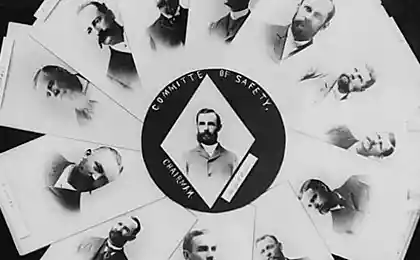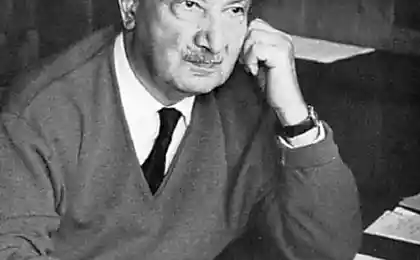504
Neuroticism of society — a necessary condition for the existence of the system
Twenty one million five hundred nine thousand eighty seven
The generally accepted concept explaining people's desire to join communities based on the need for these enterprises to jointly directed substantive activities – labor, which is more effective in groups with specialization. This concept is highly plausible in explaining the historical socialization of the person, however difficult to apply to explain the processes in modern societies. Indeed, neither humanity in General nor any one of its constituent communities cannot be considered to be structured optimally from the point of view of production activities. Almost every community has an ideological and activity components lowering productivity and living standards. All these facts lead to the idea of the existence of other preconditions of human sociality.
About a hundred years ago Freud pointed out that civilization itself makes a person neurotic, creating internal conflict between nature and the social component of the psyche. This idea was developed by followers of psychoanalytical school engaged in social and cultural applications of psychoanalysis, above all, Karen Horney and Eric Fromm, who also pointed to society posed by the modern neurotic man. In their work, the neurotic was considered as the consequence and not the cause of the existence of society. However, it is logical to assume the existence of feedback – certain forms of conventional neuroses enable society to exist in those irrational forms in which it exists.
To illustrate this point, refer to the study of the psychological characteristics of human socialization – the process of mastering the experience of social life or set of social roles, a process in which a person has to give up part of his Y. For example, for the study of totalitarian societies, it was observed that a significant role in the process of socialization is played by the action of the protective mechanism of "identification", the essence of which consists in the removal of internal tension by identifying with its geeky factor. However, vnutripsihicheskoy voltage is not always called a gross external pressure from punitive machine, as it happens in totalitarian societies. Most is a is its incompatibility with the ideal image I, the formation of which is engaged in the society. This mismatch leads to the emergence of human internal voltage, which can be expressed in the form of guilt, anxiety, etc. to Remove this stress helps the already mentioned action of protective mechanisms, among which the most significant are social identity, making people hide behind social role, compensation, prompting to action aimed at is unattainable and unnecessary to the results, etc.
The feelings of guilt that arise due to the mismatch of hypothetical social ideal, was one of the strongest methods of influence of totalitarian regimes. Examples of such ideals are the images of a "genuine Soviet person" and the "true Aryan" in their respective cultures. Another effective method of influence the group is presenting to the man deliberately inflated demands, which are impossible to match and selectively permissive control over the implementation of these requirements, also inducing a guilt complex.
To make amends, a person tries to accurately fulfill social requirements, regardless of their correctness or waives some of its legal claims, which is the source of the famous phenomenon of "legal illiteracy" of the Soviet man, still inherent in our mentality.
Another method of increasing internal anxiety is the tab hard superconscious attitudes that block the free expression of any necessary human functions. An example of such installation may be a ban on freedom of sexual manifestations in the Victorian era (such a ban was used by many religious systems). A similar nature is the ban on free expression in totalitarian societies.
Biological inability to follow such attitudes leads to anxiety and a fatal sense of guilt that kompensiruet socio – approved protection mechanisms. For example, the manifestation of such a mechanism in Victorian England was the high patriotism as a form of migration.
It is possible to allocate the whole set of socially – approved behavior. The most detail they were studied by E. Bern, who called them "psychological games." The Bern noted that psychological games are the basis of most societies and subcultures, for example, based on the American way of life is the game of "Debtor", the essence of which is that people are constantly forced to live on credit, thus putting at risk their security, which creates anxiety and sense of insecurity. The society diligently encourages its members to be debtors, thus causing the hard work, creating the impossibility of the situation when people, earning some money, the rest of his life will spend in idleness, slowly eaten earned.
The ease of manipulating the consciousness of a neurotic person is not the only social consequence of neuroticism. More important is the fact that psychological dependence is neurotic man from others, his inability to be independent, the attraction to people, which is one of conditions providing existence of human society. Thus we can talk about some social homeostasis – the existence of a neurosis members of certain social groups leads to the formation of a certain structure of the group or society (this fact is pointed out Fromm). The community in turn, by means of its structure induces neuroses necessary for self-maintenance.
What are the methods of such social induction of neuroses? Conditionally they can be divided into two groups: the first are unconscious methods described above. Among them the most important is the role of neuroticism children's parents and education system, and also the inherent human tendency to psychological infecting others with their problems, which is one of the protective mechanisms. The second group is consciously used by different social forces, methods of manipulating individual and mass consciousness, such as agitation propaganda advertising and other more subtle methods.
In summary, we note again that neuroticism members of society is not a by-product of social systems, as a necessary condition of its existence.
Author Safronov A. G.
LITERATURE: Z. Freud and I It. Tbilisi "Merani", 1994., Horney K. Female psychology. S-Pb.: WEEP, 1993., Fromm E. Psihoanaliz and ethics, M.: "Republic", 1993., Laster K. Protective mechanismy of the human psyche. New York, 1963., Berne E. Games people play. S-Pb.: "Wave" 1993.источник:psychology.ru
Source: /users/1077
The generally accepted concept explaining people's desire to join communities based on the need for these enterprises to jointly directed substantive activities – labor, which is more effective in groups with specialization. This concept is highly plausible in explaining the historical socialization of the person, however difficult to apply to explain the processes in modern societies. Indeed, neither humanity in General nor any one of its constituent communities cannot be considered to be structured optimally from the point of view of production activities. Almost every community has an ideological and activity components lowering productivity and living standards. All these facts lead to the idea of the existence of other preconditions of human sociality.
About a hundred years ago Freud pointed out that civilization itself makes a person neurotic, creating internal conflict between nature and the social component of the psyche. This idea was developed by followers of psychoanalytical school engaged in social and cultural applications of psychoanalysis, above all, Karen Horney and Eric Fromm, who also pointed to society posed by the modern neurotic man. In their work, the neurotic was considered as the consequence and not the cause of the existence of society. However, it is logical to assume the existence of feedback – certain forms of conventional neuroses enable society to exist in those irrational forms in which it exists.
To illustrate this point, refer to the study of the psychological characteristics of human socialization – the process of mastering the experience of social life or set of social roles, a process in which a person has to give up part of his Y. For example, for the study of totalitarian societies, it was observed that a significant role in the process of socialization is played by the action of the protective mechanism of "identification", the essence of which consists in the removal of internal tension by identifying with its geeky factor. However, vnutripsihicheskoy voltage is not always called a gross external pressure from punitive machine, as it happens in totalitarian societies. Most is a is its incompatibility with the ideal image I, the formation of which is engaged in the society. This mismatch leads to the emergence of human internal voltage, which can be expressed in the form of guilt, anxiety, etc. to Remove this stress helps the already mentioned action of protective mechanisms, among which the most significant are social identity, making people hide behind social role, compensation, prompting to action aimed at is unattainable and unnecessary to the results, etc.
The feelings of guilt that arise due to the mismatch of hypothetical social ideal, was one of the strongest methods of influence of totalitarian regimes. Examples of such ideals are the images of a "genuine Soviet person" and the "true Aryan" in their respective cultures. Another effective method of influence the group is presenting to the man deliberately inflated demands, which are impossible to match and selectively permissive control over the implementation of these requirements, also inducing a guilt complex.
To make amends, a person tries to accurately fulfill social requirements, regardless of their correctness or waives some of its legal claims, which is the source of the famous phenomenon of "legal illiteracy" of the Soviet man, still inherent in our mentality.
Another method of increasing internal anxiety is the tab hard superconscious attitudes that block the free expression of any necessary human functions. An example of such installation may be a ban on freedom of sexual manifestations in the Victorian era (such a ban was used by many religious systems). A similar nature is the ban on free expression in totalitarian societies.
Biological inability to follow such attitudes leads to anxiety and a fatal sense of guilt that kompensiruet socio – approved protection mechanisms. For example, the manifestation of such a mechanism in Victorian England was the high patriotism as a form of migration.
It is possible to allocate the whole set of socially – approved behavior. The most detail they were studied by E. Bern, who called them "psychological games." The Bern noted that psychological games are the basis of most societies and subcultures, for example, based on the American way of life is the game of "Debtor", the essence of which is that people are constantly forced to live on credit, thus putting at risk their security, which creates anxiety and sense of insecurity. The society diligently encourages its members to be debtors, thus causing the hard work, creating the impossibility of the situation when people, earning some money, the rest of his life will spend in idleness, slowly eaten earned.
The ease of manipulating the consciousness of a neurotic person is not the only social consequence of neuroticism. More important is the fact that psychological dependence is neurotic man from others, his inability to be independent, the attraction to people, which is one of conditions providing existence of human society. Thus we can talk about some social homeostasis – the existence of a neurosis members of certain social groups leads to the formation of a certain structure of the group or society (this fact is pointed out Fromm). The community in turn, by means of its structure induces neuroses necessary for self-maintenance.
What are the methods of such social induction of neuroses? Conditionally they can be divided into two groups: the first are unconscious methods described above. Among them the most important is the role of neuroticism children's parents and education system, and also the inherent human tendency to psychological infecting others with their problems, which is one of the protective mechanisms. The second group is consciously used by different social forces, methods of manipulating individual and mass consciousness, such as agitation propaganda advertising and other more subtle methods.
In summary, we note again that neuroticism members of society is not a by-product of social systems, as a necessary condition of its existence.
Author Safronov A. G.
LITERATURE: Z. Freud and I It. Tbilisi "Merani", 1994., Horney K. Female psychology. S-Pb.: WEEP, 1993., Fromm E. Psihoanaliz and ethics, M.: "Republic", 1993., Laster K. Protective mechanismy of the human psyche. New York, 1963., Berne E. Games people play. S-Pb.: "Wave" 1993.источник:psychology.ru
Source: /users/1077























